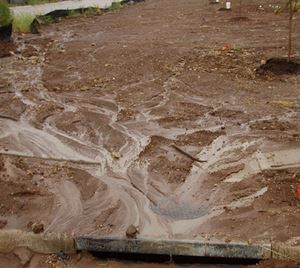
ESC and Pollution Prevention Measures
By definition Erosion and Sediment Control (ESC) is the implementation of Best Management Practices (BMPs) that will adequately control soil erosion, sedimentation, and nonagricultural runoff from regulated “land-disturbing activities” to prevent any degradation of Water Quality Standards (WQS), properties and natural resources. The control devices or BMPs used in ESC are often implemented in conjunction with each other, which allows for optimal protection to exposed soil surfaces, waterflow velocity dissipation and filtration. Pollution Prevention measures are the principles and practices used to reduce the amount of any hazardous substance, pollutant, or contaminant entering into waste streams or released into the environment prior to recycling, treatment, or disposal. These measures reduce the hazards to public health and the environment associated with the release of such substances, pollutants, or contaminants from construction project or industrial sites.
Best Management Practices (BMPs)
In an effort to help curb stormwater and effectively prevent water pollution, implementing Best Management Practices (BMPs) is a regulatory requirement on construction, industrial and municipal project sites. A Best Management Practice (BMP) is a practice, or combination of practices that are determined to be the most effective and practicable (technologically, economically, and institutionally) means of controlling point and nonpoint source pollutants at levels compatible with environmental quality goals.
There are Three (3) Types of BMPs:
-

Erosion Control
-

Pollution Prevention
-

Sediment Control




